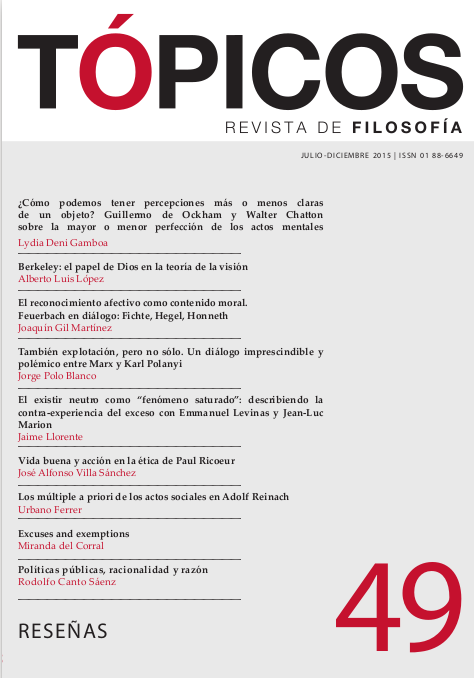Publicado 2015-07-31
Palabras clave
- reconocimiento,
- afectividad,
- autoconciencia,
- eticidad,
- moralidad
Cómo citar
Resumen
La filosofía feuerbachiana supone un relevante paso en la superación de cierta tradición filosófica basada en categorías meramente especulativas y metafísicas, y ello a partir de una concepción ética y antropológica que enraíza directamente con la perspectiva del reconocimiento recíproco. No obstante, el peso que adquiere la dimensión afectiva en la propuesta ética de Feuerbach problematiza, de hecho, la posibilidad de considerar la perspectiva del reconocimiento como contenido normativo de la moral a la hora de formular pretensiones de universalidad. En este sentido, el presente trabajo trata de reflexionar sobre la actualidad del pensamiento feuerbachiano a partir de la reconstrucción de dicha perspectiva recognoscente, teniendo en cuenta tanto sus límites como posibilidades.
Referencias
- Arrese, H. (2007). Autoconciencia y reconocimiento en la teoría fichteana de la exhortación. Revista Actio, 9, 117-122.
- Acosta López, M. R. (2009). Hegel y el concepto ‘puro’ de reconocimiento: la intersubjetividad como constitutiva de la subjetividad. En Intersubjetividad. Ensayos filosóficos sobre autoconciencia, sujeto y acción. F. Emilce y W. Duica (Eds.) (17-44). Bogotá: Universidad Nacional de Colombia.
- Asheri, C. (1969). Feuerbachs Bruch mit der Spekulation. Frankfurt: Europäische Verlagsanstalt.
- Baynes, K. (2002). Freedom and recognition in Hegel and Habermas. Philosophy and Social Criticism, XXVIII-1, 1-17.
- Clarke, J. A. (2009). Fichte and Hegel on recognition. British Journal for the History of Philosophy, XVII-2, 365-385.
- Emel Rendón, C. (2009). Fichte: el reconocimiento y sus implicaciones. Éndoxa, 23, 191-207.
- Feuerbach, L. (1960). Sämtliche Werke (Hrsg. W. Bolin y F. Jodl), Stuttgart/ Bad-Cannstatt: Fromann Verlag.
- ____ (1969). Gesammelte Werke (Hrsg. W. Schuffenhauer). Berlín: Akademie Verlag.
- Fichte, J. G. (1979). Grundlage des NaturrechtsnachPrinzipien der Wissenschaftslehre. Hamburg: Meiner.
- Giusti, M. (2007). Autonomía y reconocimiento. Ideas y Valores, 133, 39-56.
- Habermas, J. (1984). Ciencia y técnica como ideología. Madrid: Tecnos.
- Hegel, G.W.F. (1969a). Jenaer Realphilosophie. Berlín: Akademie Verlag.
- ____ (1969b). Werke (Hrsg. E. Moldenhauer y K. M. Michel). Frankfurt: Suhrkamp.
- Honneth, A. (1992). Integridad y desprecio. Motivos básicos de una concepción de la moral desde la teoría del reconocimiento. Isegoría, 5, 78-92.
- ____ (1994). Kampf um Anerkennung, Zur moralischen Grammatik socialer Konflikte. Frankfurt: Suhrkamp.
- ____ (1996). Reconocimiento y obligaciones morales. RIFP. Revista Internacional de Filosofía Política, 8, 5-17.
- ____ (2001). Leiden an Unbestimmtheit. Stuttgart: Reclam.
- ____ (2003). Unsichtbarkeit. Stationen einer Theorie der Intersubjetivität. Frankfurt: Suhrkamp.
- Lefèvre, W. (1994). Feuerbach und die Grenzen der Ethik. En Solidarität oder Egoismus. Studien zu einer Ethik bei und nach Ludwig Feuerbach. H.-J Brauen y W. Schuffenhauer (Eds.) (125-140). Berlín: Akademie- Verlag.
- López Álvarez, P. (2001). El sujeto impropio. Identidad, reconocimiento y autonomía. Logos. Anales del Seminario de Metafísica, 3, 23-43.
- Siep, L. (1979). Anerkennung als Prinzip der praktischen Philosophie: Untersuchen zu Hegels Jenaer Philosophie des Geistes. Freiburg: Alber.
- Stirner, M. (1901). Der Einzige und sein Eigentum. Leipzig: Otto Wigand.
- Wildt, A. (1982). Autonomie und Anerkennung: Hegel Moralkritik im Licht seiner Fichte-Rezeption. Stuttgart: Klett-Cotta Verlag.
- Williams, R. (1992). Recognition: Fichte and Hegel on the Other. Albany: University of New York Press.
- ____ (1998). Hegel’s Ethics of Recognition. Los Angeles: University of California Press.






